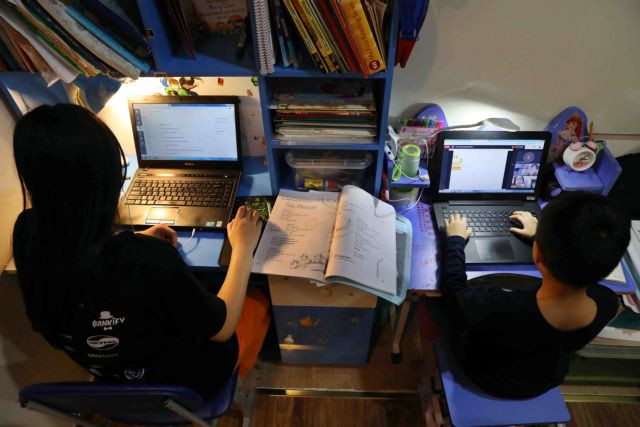 Students in Hanoi study online. Experts at an online conference held by the Vietnam Women’s Academy branch in HCM City on October 16 said that students need to learn how to protect themselves online. (Photo: VNA)
Students in Hanoi study online. Experts at an online conference held by the Vietnam Women’s Academy branch in HCM City on October 16 said that students need to learn how to protect themselves online. (Photo: VNA)Children are currently spending a great deal of time online, especially foracademic study, due to the COVID-19 pandemic. They often feel restless whenelectronic devices such as their smartphone are not near them, according toGiang.
Her 2019 study of online game addiction among 300 students at one secondaryschool in HCM City showed that 80 percent accessed the internet for more thanfour hours each day. Besides online games, they were also attracted by YouTubeand other websites.
Children need to be more aware of their usage and learn how to managethemselves and make decisions about their responsibilities, according to Giang.
Many parents lack the skills necessary to protect their children in cyberspace.Some parents have contacted psychologists to help children control their gameor internet addiction.
As parents, many delegates in the conference said they needed guidance on theskills and tools that would help protect their children in cyberspace.
Children can face serious risks, including cyberbullying, sextortion and risksto privacy. These have become particularly acute amid the COVID-19 outbreak.
Dr Hoang Tuan Ngoc, a lecturer at HCM City University of Education, said thather survey about abuse among students showed that 30 percent of them hadexperienced abuse in an internet environment.
Government programmes
Nguyen Thi Nga, deputy head of the Department of Child Affairs under theMinistry of Labour, Invalids and Social Affairs, said the Government had issuedlegal regulations on protecting safety for children in cyberspace.
Prime Minister Pham Minh Chinh has approved a national programme on childprotection online, which aims to protect the privacy of children and preventand handle acts of abuse.
It focuses on supplying children with age-appropriate knowledge and skills sothat children can protect themselves when online.
A network for rescue and protection of children in cyberspace has also been setup. The department operates the hotline 111 to receive information relating tochildren’ problems.
According to a department report, more than 700,000 child sexual-abuse imagesand videos were found online in Vietnam last year.
A UNICEF survey of children and young people in Vietnam showed that one-fifthof the total number of surveyed children had been victims of cyber bullying.
Nearly 20 million children in Vietnam use social media.
Tran Thi Kim Thanh, head of the Children Affairs and Gender Equality Divisionunder the HCM City Department of Labour, Invalids, and Social Affairs, said thedivision would work with the city Department of Education and Training to haveprogrammes to strengthen communication about knowledge and skills on keepingsafe in cyberspace for parents and children.
The division's staff will receive training about this issue./.





























